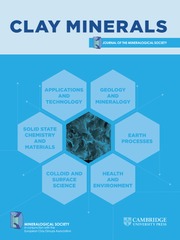Crossref Citations
This article has been cited by the following publications. This list is generated based on data provided by
Crossref.
Meunier, Alain
Mas, Antoine
Beaufort, Daniel
Patrier, Patricia
and
Dudoignon, Patrick
2008.
Clay Minerals in Basalt-Hawaiite Rocks From Mururoa Atoll (French Polynesia). II. Petrography and Geochemistry.
Clays and Clay Minerals,
Vol. 56,
Issue. 6,
p.
730.
Molenaar, N.
Cyziene, J.
Sliaupa, S.
and
Craven, J.
2008.
Lack of inhibiting effect of oil emplacement on quartz cementation: Evidence from Cambrian reservoir sandstones, Paleozoic Baltic Basin.
Geological Society of America Bulletin,
Vol. 120,
Issue. 9-10,
p.
1280.
Peng, Jun
Liu, Jinku
Wang, Yan
and
Liu, Jianfeng
2009.
Origin and controlling factors of chlorite coatings—an example from the reservoir of T3x Group of the Baojie area, Sichuan Basin, China.
Petroleum Science,
Vol. 6,
Issue. 4,
p.
376.
Chen, Guojun
Du, Guichao
Zhang, Gongcheng
Wang, Qi
Lv, Chengfu
and
Chen, Ji
2011.
Chlorite cement and its effect on the reservoir quality of sandstones from the Panyu low-uplift, Pearl River Mouth Basin.
Petroleum Science,
Vol. 8,
Issue. 2,
p.
143.
Zhang, Xia
Lin, Chun‐Ming
Cai, Yuan‐Feng
Qu, Chang‐Wei
and
Chen, Zhao‐You
2012.
PORE‐LINING CHLORITE CEMENTS IN LACUSTRINE‐DELTAIC SANDSTONES FROM THE UPPER TRIASSIC YANCHANG FORMATION, ORDOS BASIN, CHINA.
Journal of Petroleum Geology,
Vol. 35,
Issue. 3,
p.
273.
Dowey, Patrick J.
Hodgson, David M.
and
Worden, Richard H.
2012.
Pre-requisites, processes, and prediction of chlorite grain coatings in petroleum reservoirs: A review of subsurface examples.
Marine and Petroleum Geology,
Vol. 32,
Issue. 1,
p.
63.
Zou, Caineng
2013.
Unconventional Petroleum Geology.
p.
61.
Friis, Henrik
Molenaar, Nicolaas
and
Varming, Thomas
2014.
Chlorite meniscus cement – implications for diagenetic mineral growth after oil emplacement.
Terra Nova,
Vol. 26,
Issue. 1,
p.
14.
Blamey, Nigel J.F.
Azmy, Karem
and
Brand, Uwe
2014.
Provenance and burial history of cement in sandstones of the Northbrook Formation (Carboniferous), western Newfoundland, Canada: A geochemical investigation.
Sedimentary Geology,
Vol. 299,
Issue. ,
p.
30.
Al Gahtani, Fahad
2014.
Diagenetic controls on evolution of porosity in the Permian Illawarra Coal Measures, Southern Sydney Basin, Australia.
Arabian Journal of Geosciences,
Vol. 7,
Issue. 12,
p.
5473.
Sun, Zhi‐Xue
Sun, Zhi‐Lei
Yao, Jun
Wu, Ming‐Lu
Liu, Jun‐Rong
Dou, Zhenya
and
Pei, Chang‐rong
2014.
POROSITY PRESERVATION DUE TO AUTHIGENIC CHLORITE COATINGS IN DEEPLY BURIED UPPER TRIASSIC XUJIAHE FORMATION SANDSTONES, SICHUAN BASIN, WESTERN CHINA.
Journal of Petroleum Geology,
Vol. 37,
Issue. 3,
p.
251.
Wilson, M. J .
Wilson, L.
and
Patey, I .
2014.
The influence of individual clay minerals on formation damage of reservoir sandstones: a critical review with some new insights.
Clay Minerals,
Vol. 49,
Issue. 2,
p.
147.
YANG, Renchao
FAN, Aiping
van LOON, A. J.
HAN, Zuozhen
and
WANG, Xiuping
2014.
Depositional and Diagenetic Controls on Sandstone Reservoirs with Low Porosity and Low Permeability in the Eastern Sulige Gas Field, China.
Acta Geologica Sinica - English Edition,
Vol. 88,
Issue. 5,
p.
1513.
Huggett, J. M.
Burley, S.D.
Longstaffe, F. J.
Saha, S.
and
Oates, M. J.
2015.
THE NATURE AND ORIGIN OF AUTHIGENIC CHLORITE AND RELATED CEMENTS IN OLIGO–MIOCENE RESERVOIR SANDSTONES, TAPTI GAS FIELDS, SURAT DEPRESSION, OFFSHORE WESTERN INDIA.
Journal of Petroleum Geology,
Vol. 38,
Issue. 4,
p.
383.
Rainoldi, Ana L.
Franchini, Marta
Beaufort, Daniel
Mozley, Peter
Giusiano, Adolfo
Nora, Cesaretti
Patrier, Patricia
Impiccini, Agnes
and
Pons, Josefina
2015.
Mineral reactions associated with hydrocarbon paleomigration in the Huincul High, Neuquén Basin, Argentina.
Geological Society of America Bulletin,
Vol. 127,
Issue. 11-12,
p.
1711.
2015.
A Color Guide to the Petrography of Sandstones, Siltstones, Shales and Associated Rocks.
p.
273.
Beaufort, D.
Rigault, C.
Billon, S.
Billault, V.
Inoue, A.
Inoue, S.
and
Patrier, P.
2015.
Chlorite and chloritization processes through mixed-layer mineral series in low-temperature geological systems – a review.
Clay Minerals,
Vol. 50,
Issue. 4,
p.
497.
Xiang, Fang
Wang, Yuwan
Feng, Qin
Zhang, Deyan
and
Zhao, Junxing
2016.
Further research on chlorite rims in sandstones: evidence from the Triassic Yanchang Formation in the Ordos basin, China.
Arabian Journal of Geosciences,
Vol. 9,
Issue. 7,
Inoué, Sayako
and
Kogure, Toshihiro
2016.
High-Resolution Transmission Electron Microscopy (HRTEM) Study of Stacking Irregularity in Fe-Rich Chlorite From Selected Hydrothermal Ore Deposits.
Clays and Clay Minerals,
Vol. 64,
Issue. 2,
p.
131.
Yu, Yu
Lin, Liang-Biao
and
Gao, Jian
2016.
Formation mechanisms and sequence response of authigenic grain-coating chlorite: evidence from the Upper Triassic Xujiahe Formation in the southern Sichuan Basin, China.
Petroleum Science,
Vol. 13,
Issue. 4,
p.
657.

